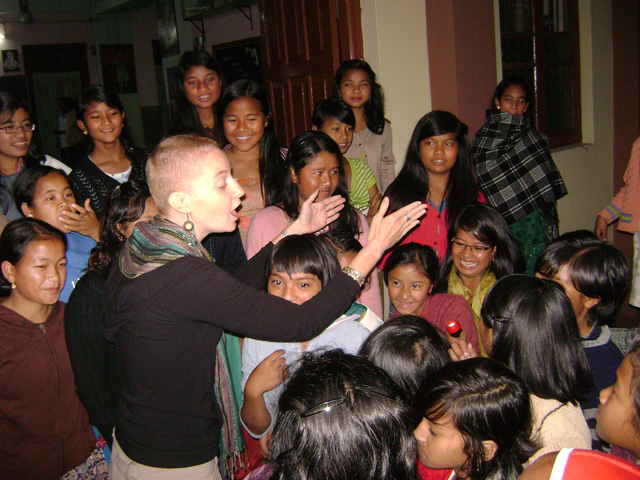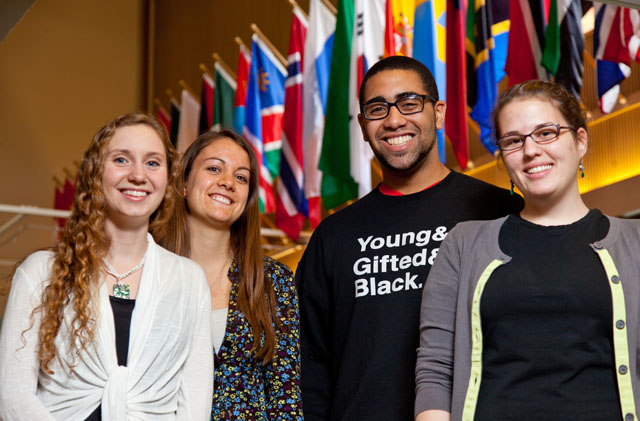Page 28 • (1,785 results in 0.032 seconds)
-
Join the national celebration of international education & exchange. PLU International Student Services and the Wang Center for Global and Community Engaged Education invite you to a week of
MoreWebsiteIES Berlin, GermanyChoose between a language immersion track (Language & Area Studies) or one of two English-based academic tracks (Metropolitan and Urban Studies / Security Studies and International Affairs)Language & Area StudiesMetropolitan & Urban Studies / Security Studies & Intl. AffairsIES Milan, Italy: MusicStudy music performance, history and more, variety of elective optionsWebsiteIES Vienna, Austria: Music / Psychology and Social SciencesStudy music performance, history, and more, and
-
The Press is named in honor of T. Leslie Elliott, a retired editor and bookseller who in 1974 began teaching a course in the English Department entitled “The World of the Book.
of type, many intricately carved ornaments, and stamps depicting everything from dental charts to 1920s roadsters.The History of the Elliott PressThe Press is named in honor of T. Leslie Elliott, a retired editor and bookseller who in 1974 began teaching a course in the English Department entitled “The World of the Book.” Thanks to Elliott’s efforts, PLU was offered its first gift of letterpress equipment in the late 1970s. Over the years, other gifts of presses, type, and related materials
-

Karissa Bryant ’03 with school girl at Sacred Heart Boarding School in Shillong, India. Here Bryant is asking the girls who live at the school what they wanted to be when they grew up. In the evening they would share Khasi songs with Bryant and…
took their final high school exam, 50 percent failed. “The biggest problem with education is that students are taught in their native language and then they are expected to pass high school in English,” Bryant said. “If they don’t get an education, then they have no future.” Bryant worked with the Salesian Sisters, who run BCC, to give students Karissa Bryant sits with a daughter of the Self Help Group member in Umphrew – a village outside of Shillong. The group members make bricks and sell them in
-

Carolyn Hylander ’12, Caitlin Walton ’12, Mycal Ford ’12 and Gretchen Elyse Nagel ’12 received Fulbright Student Fellowships. (Photo by John Froschauer) Four PLU students receive Fulbright Student Fellowships By Chris Albert This year, four PLU students – Carolyn Hylander, Caitlin Walton, Gretchen Elyse Nagel…
– ETA in Ibagué, Colombia Hylander – from Seattle – double majored in Hispanic studies and global studies. She has accepted a Fulbright English Teaching Assistant (ETA) in Ibagué, Colombia, where she will be teaching part-time as an ETA at Universidad de Ibagué and doing part-time research in the community about U.S.–Colombia free trade policies. “To me, receiving a Fulbright grant means that I will help foster cross-cultural understanding between Colombians that I will meet and myself as a
-
Peace Corps Prep (PC Prep) is an undergraduate certificate program that helps students prepare for service in the Peace Corps, a US-government organization that sends US citizens abroad to volunteer
PLU or demonstrate equivalent proficiency. This will ensure that you have the skills you need to start communicating in a place where English is likely not the national language. Intercultural competence: You will take three courses that relate to global diversity and world cultures. This will prepare you to interact with the people you serve in a thoughtful, educated way. Professional and leadership development: This component involves having Alumni and Student Connections help you with your
-

Philosophy professor Adam Arnold is a new addition to PLU’s faculty. Originally from the Tacoma area, he earned a Bachelor of Arts degree from the University of Washington, Tacoma in 2009. From there, he earned the opportunity to study away at Johann Wolfgang Goethe University…
. Arnold’s values is communication, which “necessitates respecting and taking others seriously.” When Dr. Arnold isn’t in the classroom teaching philosophy, he enjoys hiking and viewing the outdoor wonders of the Pacific Northwest. Janet Koplitz is a senior majoring in English / Writing. She wrote this article as part of her work in the Fall 2017 English Nonfiction Writing capstone. Read Previous Indivisible: English Faculty Members Join the Anti-Trump Resistance Read Next Collin Brown: A Lute Returns
-

Professor of English | Gender, Sexuality, and Race Studies | barotrp@plu.edu | 253-535-7318 | Rick Barot has published three books of poetry with Sarabande Books: The Darker Fall (2002), which received the Kathryn A.
Rick Barot Professor of English Phone: 253-535-7318 Email: barotrp@plu.edu Office Location:Hauge Administration Building - Room 209 Website: https://rickbarot.com/ Professional Biography Additional Titles/Roles Director of MFA Education M.F.A., Iowa Writers' Workshop, 1998 B.A., Wesleyan University, 1992 Areas of Emphasis or Expertise Creative Writing Poetry Ethnic Literature Gay/Lesbian Literature Books Chord: Poems (Sarabande Books 2015) : View Book Want: Poems (Sarabande Books 2008) : View
-

Immersive experience in classrooms on the other side of the world teach PLU students how to learn on the fly, one of many skills they bring home with them.
also taught geography, a steep learning curve for a newcomer with very little knowledge of the country. First GlimpseRead what Allison Rise '12 has to say about her journey abroad in Namibia. “I had to teach the 13 regions of Namibia,” she said, eyes wide. “That prepared me to be a school psychologist, jumping in and figuring it out as I go.” Another challenge was communicating. Allison said many of the students she worked with in Windhoek still were learning English. Overcoming a language barrier
-
The ACS International Research Experience for Students (IRES) program is seeking applications from qualified U.S. undergraduate students to conduct research in either Germany or Singapore. Students spend 10-12 weeks working on frontier chemical and materials science research projects under the guidance of faculty members and…
skills, develop collaborations with scientists abroad, and experience the life and culture of a foreign country. Applicants do not need to be ACS members or fluent in non-English languages. Participating students will receive: Housing and meal allowance Travel expenses Language training allowance International medical insurance coverage Participation in professional conferences Qualified students must: Be a U.S. citizen or permanent resident Be a full-time student in a chemistry, materials science
-
Graduation year: 2012 Majors: Global Studies and French Studied away in Fort-de-France, Martinque (PLU J-Term), Yaoundé, Cameroon (SIT semester) and Elverum, Norway (PLU Gateway semester at the
, course content and program structures were quite dissimilar – and each taught my something new, about the subjects I was studying, about the respective cities and countries and ultimately about myself.However, I also felt as though each experience built on the last. In addition to the highly practical language and cross-cultural skills I gained through living and studying in various places, my study away experiences helped to develop my sense of adventure and taught me how to adapt to diverse
Do you have any feedback for us? If so, feel free to use our Feedback Form.


